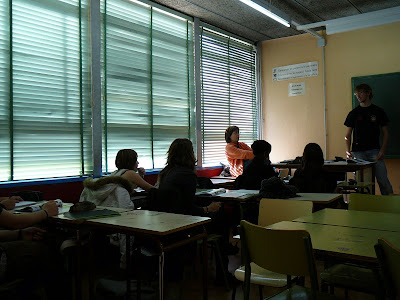
- Involve students with real English oral production
- Learn ways of expressing weather predictions
- Use technological resources (Audacity, Blogs…)
- Produce competent oral productions
- Express both orally and in writing their own creation
-Communicative linguistic and audiovisual
-Artistic and cultural
-Treatment of information and digital competence
-Learning to learn
-Autonomous and personal initiative competence
CONTENTS:
-Present simple and continuous tense
-Weather vocabulary
-Pronunciation tools
-Information and technology tools
Session 1
(Listening and writing)
1. Listen carefully and do the activity proposed about weather. Afterwards, tell me through an entrance on your blog whether you like the activity or not.
√ If you need a bit of support according to weather vocabulary you can use this website: http://www.youtube.com/watch?v=PScGbLBOvKo
(Listening)
2. Who is Gerard Butler? Do you want to see him as a weather forecaster?
(Writing)
3. You are almost experts now! Write down a SHORT weather prediction for today of your country. Write it and upload it in your blog. I’ll correct it as soon as possible!
Session 2
(Reading and listening)
1. Read some of these nursery rhymes http://www.nurseryrhymesonline.com/weather/ and choose one of them, the one that you most like. Then, look for it in youtube and check its pronunciation.
√ There is a free online pronunciation dictionary. Check it if necessary:
2. You must record your own voice (with Audacity) as a formal weather forecaster BOTH with the prediction you wrote down the last day in your blog and with the chosen nursery rhyme in the end. Good luck!
√ There is a free online pronunciation dictionary. Check it if necessary:






 Last Tuesday we worked on Frankenstein. It was interesting because the monster is a character that is usually known by everybody; however, I feel that my students were able to know much more things about this work and could enter into it in a different way.
Last Tuesday we worked on Frankenstein. It was interesting because the monster is a character that is usually known by everybody; however, I feel that my students were able to know much more things about this work and could enter into it in a different way.

 Finally, we dealt with Harry Potter and the series of books of J.K Rowling. It was really interesting because students had almost all read a novel or seen a film of Harry Potter. Therefore, they felt much more involved within the activities.
Finally, we dealt with Harry Potter and the series of books of J.K Rowling. It was really interesting because students had almost all read a novel or seen a film of Harry Potter. Therefore, they felt much more involved within the activities.
